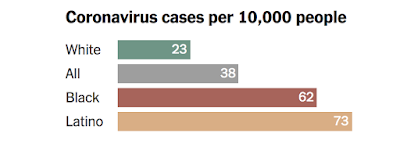Guaranteed to induce most of us to back down. But now there's a new twist -- "You DON'T want a piece of me? Let's take it outside."
People are inventing lots of new ways to take life outside. Schools are erecting tents with open sides, musicians are strolling around and performing on sidewalks and in driveways. And meetings of all kinds are assembling in parking lots with chairs carefully spaced apart. Historically, while fighting epidemics of tuberculosis, schools moved classes outside EVEN IN THE WINTER.
The impetus for this is the clear evidence that the coronavirus is spread through the air, surely as droplets from coughing and sneezing, but likely as an invisible mist of aerosolized particles. If you remember the movie, Outbreak, in which Cuba Gooding, Jr., makes an antidote in a trailer in about a day, you'll remember the great scene in the movie theater. An infected person sneezes, and the droplets go into the air and all over the movie theater, infecting everyone who's there. Obviously the infectious mist is invisible, so the special effects people colorized it for our fear and trembling. Now, every article I read about the invisible mist, I think of that scene.
I, personally, don't want to go in anywhere. I have to go to the supermarket, and occasional doctor visits. That's enough. Everything else, I want to move outside. I'm considering getting a gas grill so that the great chefs of my acquaintance can cook in the backyard!
And it inspires a re-visit of the old taunt, "Coronavirus, you think you can get a piece of me? Let's take it outside!"



